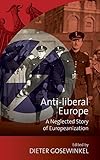Anti-liberal Europe : A Neglected Story of Europeanization / ed. by Dieter Gosewinkel.
Material type: TextSeries: New German Historical Perspectives ; 6Publisher: New York ; Oxford : Berghahn Books, [2014]Copyright date: ©2014Description: 1 online resource (210 p.)Content type:
TextSeries: New German Historical Perspectives ; 6Publisher: New York ; Oxford : Berghahn Books, [2014]Copyright date: ©2014Description: 1 online resource (210 p.)Content type: - 9781782384250
- 9781782384267
- 320.5094 23
- JC574.2.E85 A67 2015
- JC574.2.E85 A67 2015eb
- online - DeGruyter
| Item type | Current library | Call number | URL | Status | Notes | Barcode | |
|---|---|---|---|---|---|---|---|
 eBook
eBook
|
Biblioteca "Angelicum" Pont. Univ. S.Tommaso d'Aquino Nuvola online | online - DeGruyter (Browse shelf(Opens below)) | Online access | Not for loan (Accesso limitato) | Accesso per gli utenti autorizzati / Access for authorized users | (dgr)9781782384267 |
Browsing Biblioteca "Angelicum" Pont. Univ. S.Tommaso d'Aquino shelves, Shelving location: Nuvola online Close shelf browser (Hides shelf browser)

|

|

|

|

|

|

|
||
| online - DeGruyter Kinship, Community, and Self : Essays in Honor of David Warren Sabean / | online - DeGruyter Sounds of Modern History : Auditory Cultures in 19th- and 20th-Century Europe / | online - DeGruyter The Emergence of Film Culture : Knowledge Production, Institution Building, and the Fate of the Avant-Garde in Europe, 1919–1945 / | online - DeGruyter Anti-liberal Europe : A Neglected Story of Europeanization / | online - DeGruyter A World of Populations : Transnational Perspectives on Demography in the Twentieth Century / | online - DeGruyter Karl Marx : An Intellectual Biography / | online - DeGruyter Rivers, Memory, And Nation-building : A History of the Volga and Mississippi Rivers / |
Frontmatter -- Contents -- Illustrations -- Acknowledgements -- Part I. Concepts -- Introduction: Anti-liberal Europe – A Neglected Source of Europeanism -- 1 The Elusiveness of European (Anti-)liberalism -- Part II Anti-liberalism: A Feature of Colonial and Conservative Concepts of Europe -- 2 Europe as a Colonial Project: A Critique of its Anti-liberalism -- 3 Facing the Future Backwards: ‘Abendland’ as an Anti-liberal Idea of Europe in Germany between the First World War and the 1960s -- 4 The Call for a New European Order: Origins and Variants of the Anti-liberal Concept of the ‘Europe of the Regions’ -- Part III. Anti-liberal Europe in Dictatorships and their Aftermath -- 5 The ‘New European Order’ of National Socialism Some Remarks on its Sources, Genesis and Nature -- 6 Three Kinds of Collaboration Concepts of Europe and the ‘Franco-German Understanding’ – The Career of SS-Brigadeführer Gustav Krukenberg -- 7 Communist Europeanism: A Case Study of the GDR -- Afterword: The Limits of an Anti-liberal Europe -- Notes on Contributors -- Index
restricted access online access with authorization star
http://purl.org/coar/access_right/c_16ec
The history of modern Europe is often presented with the hindsight of present-day European integration, which was a genuinely liberal project based on political and economic freedom. Many other visions for Europe developed in the 20th century, however, were based on an idea of community rooted in pre-modern religious ideas, cultural or ethnic homogeneity, or even in coercion and violence. They frequently rejected the idea of modernity or reinterpreted it in an antiliberal manner. Anti-liberal Europe examines these visions, including those of anti-modernist Catholics, conservatives, extreme rightists as well as communists, arguing that antiliberal concepts in 20th-century Europe were not the counterpart to, but instead part of the process of European integration.
Mode of access: Internet via World Wide Web.
In English.
Description based on online resource; title from PDF title page (publisher's Web site, viewed 25. Jun 2024)


